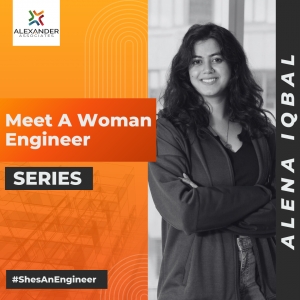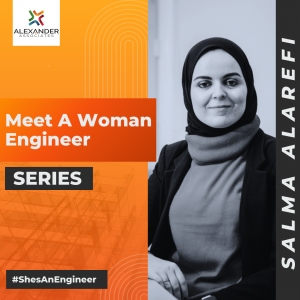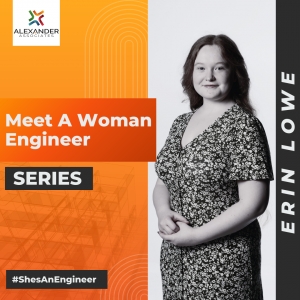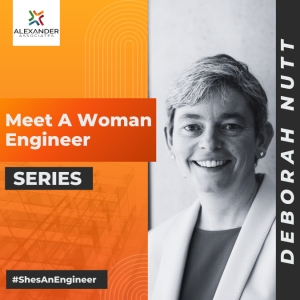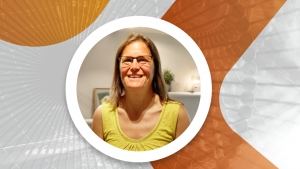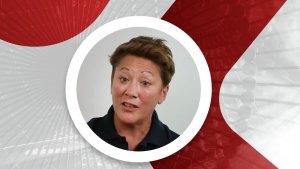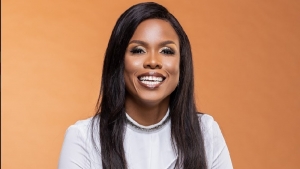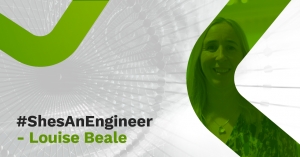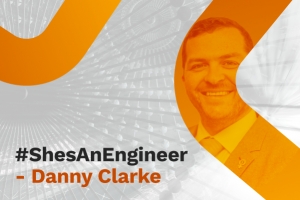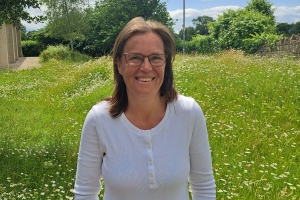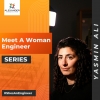MEET A WOMAN ENGINEER - ALENA IQBAL
Name: Alena Iqbal Meng (Hons)
Job Title: Project Manager – Digital Transformation
Location: Manchester
Alena Iqbal is a Project Manager at Amey. Alena's journey into engineering began at the age of 16 during a work experience at an engineering consultancy. While her peers spent their 1-week work experience photocopying documents, Alena had the opportunity to size a nitric acid tank, which sparked her passion for problem-solving and understanding chemical properties. The supportive and inspiring project manager she worked with played a key role in her decision to pursue engineering, leading her to study Chemical and Process Engineering at the University of Leeds.
Today, Alena thrives in her role, where every day brings new challenges. As a Project Manager she leads digitalisation projects, most recently working on a project to digitalise the planning process of Amey’s construction teams.
As a woman of colour in a traditionally male-dominated field, Alena has faced numerous challenges, yet she has always persevered. A leadership program with Amey helped her overcome imposter syndrome, boosting her confidence and fuelling her advocacy for more women of colour in senior roles within the rail industry. Inspired by the mentorship she received from two female graduates early in her career, Alena is now a passionate mentor herself, dedicated to creating more opportunities for women and paying it forward by coaching and guiding the next generation of engineers.
Today, we explore Alena's journey, as she shares her career path and encourages young girls to pursue their passions in engineering with confidence and without hesitation.
When did you realise that a career in engineering was right for you? Was there a particular moment in your life?
When I was 16, I did a 1-week work experience at an engineering consultancy which inspired me to become an engineer. While my friends spent their 1-week work experience photocopying documents, the PM looking after me had different plans! By the end of the week, I had sized a nitric acid tank. I enjoyed the problem-solving and the learning that came with it, such as calculations and understanding chemical properties. However, it was the team that made this experience truly memorable. I was especially inspired by the PM’s passion for all things engineering, and as a result, I decided to study engineering at university.
What does an average day look like for you?
It varies as I like to get involved in different projects and initiatives. I have weekly catchups with project teams to identify any issues with our digital processes and work towards resolving these. For processes that need fine tuning, I have a detail-oriented approach. The overarching theme is collaborative problem solving as I rely heavily on the expertise of some incredibly talented individuals. I’ve recently worked on a project to digitalise the planning process our construction teams use which has been challenging yet rewarding.
How did you get into this career? What qualifications did you get?
I was looking for a project management graduate scheme and this role seemed like a good fit. Due to the scale of the project and me being on a graduate scheme, I was able to try my hand at several roles which helped me hone in on what I enjoy: Process Optimisation! I graduated from the University of Leeds with a Masters in Chemical and Process engineering (MEng) which has been handy when working on processes in rail!
Did you face any challenges with your career decision as a woman engineer?
I’m a big believer in “If you can see her, you can be her” and I very much did not “see her” when I started, especially in senior roles. Initially, I felt like I didn’t belong in any room I walked into, and I’m sure this reflected in my behaviour as I questioned “Am I supposed to be here?”.
I completed a leadership programme with Amey specifically aimed at individuals from multicultural backgrounds. This programme, along with the mentoring l received, empowered me and helped me overcome my doubts. The rail industry has been championing gender diversity massively which is really promising. However, women of colour are still very much missing, especially in senior management; I’m expecting this to change soon.
What advice would you give to young girls considering a career in engineering?
Pursue your interests to the ends of the earth, whatever they may be. Don’t let society dictate where you do or don’t belong, and don’t self-reject! Operating from a place of abundance will yield far greater results than operating from a place of scarcity - build each other up. This mindset has greatly helped me in my career; where others have seen obstacles, I’ve seen opportunities.
Do you have any standout memories from your career as an engineer?
I do! During my 1-week work experience (mentioned earlier), two female graduates took me under their wing. I returned to that same engineering consultancy for work placements over the next few summers, and being around these women had a profound impact on me. Their genuine mutual respect and the care they showed me have stayed with me. In male-dominated fields, women can feel like they are fighting for one seat at the table; these women taught me the importance of creating more seats at the table. This experience is a driving force for the coaching and mentoring I do with early career professionals in my own industry. I believe it’s my responsibility to pay it forward.
Curious about our #ShesAnEngineer series? Dive into our video series featuring women who are driving change and breaking down barriers in their field. Discover their inspiring stories here: https://www.alexander-assoc.co.uk/women-in-engineering.
MEET A WOMAN ENGINEER - SALMA ALAREFI
Salma Alarefi is a Lecturer in Engineering Education at the University of Leeds, where she teaches and supports the development of future engineers. Her expertise focuses on renewable energy systems, and she delivers lectures, laboratory sessions, and supervises students' technical projects.
Salma developed an interest in engineering during school, where she felt most comfortable in maths and physics classes. As a person who stammers, she enjoyed problem-solving activities that allowed for minimal verbal interaction. The satisfaction she gained from solving problems boosted her confidence in choosing engineering as a career. Inspired by her maths teacher, who demonstrated how math applies to everyday life, Salma became passionate about STEM, seeing it as a way to make a meaningful impact while staying within her comfort zone.
Today, Salma balances teaching, tutoring, project supervision, and research in engineering education. She holds a PhD and is a Fellow of the Higher Education Academy.
As a finalist for the IET Young Woman Engineer of the Year 2024, Salma is a passionate advocate for young girls in engineering. Having faced challenges as a woman in the field, she now uses these experiences as motivation to push forward.
Today, we dive into her story, exploring the experiences and lessons that have driven her success and shaped her journey.
When did you realise that a career in engineering was right for you? Was there a particular moment in your life?
At school, as a person who stammers I always felt more comfortable during maths and physics classes. I enjoyed indulging in problem solving activities that I could do on my own with minimal verbal interaction with my peers. From a very early stage of my education the satisfaction I used to get from being able to solve problems made me more assertive about choosing to study engineering. I was always fascinated about how my maths teacher always advocated for how maths is applied to every aspect of our everyday life ( measurements of ingredients, alignment of furniture, time and time management and schedule of our life, etc ) that made me even more passionate about STEM as it meant I could still have the chance to make an impact on everyday life without having to do something that would throw me out of my comfort zone
What does an average day look like for you?
The nature of my job, in teaching and supporting the learning of future generations, allows me great flexibility to be involved with engineering through different lenses. Ranging from technical hand on through my lab teaching and supervision of student projects, tutoring students and helping them with job applications and mentoring students in placement, to doing research to gain more insights on the experience of engineering students, contributing to engineering education policies and pedagogy.
How did you get into this career? What qualifications did you get?
I hold a PhD and during my PhD studies I worked as a lab demonstrator to support the delivery of lab sessions which allowed me to certify as associate fellow of higher education academy.
Did you face any challenges with your career decision as a woman engineer?
Of course I did and continue to, it was very challenging at the start and I remember all the emotions and moments of loneliness that I experienced. The thing I do differently now is that I use these as an opportunity to encourage myself to push more. I do not accept to be victimised for being a minority anymore.
What advice would you give to young girls considering a career in engineering?
Engineering is not just about field work. An engineering career, like engineering itself, is full of creative opportunities, is continuously evolving and dynamic but in a positive way. Society needs solutions and innovation that can address challenges that are specific to women and that can only be done by having more women on board. If you get on board, you have a great chance to make a lasting impact.
Do you have any funny or interesting stories from your career as an engineer?
The funniest memory was during my first lecture, when every student who walked into the lecture theatre and saw me got their phone out to check if they were in the correct lecture/venue. After they’d charge me, they would look at me and smile apologetically. I do not blame them as you do not see many women lectures in engineering, let alone a midline female lecture.
Curious about our #ShesAnEngineer series? Dive into our video series featuring women who are driving change and breaking down barriers in this male-dominated field. Discover their inspiring stories here: https://www.alexander-assoc.co.uk/women-in-engineering.
MEET A WOMAN ENGINEER - ERIN LOWE
Erin is a third-year Electrical Engineering Apprentice at Mazak, where she specialises in the CV5-500 machine line. From a young age, Erin knew that engineering was her true calling. While other kids were into trends and toys, Erin found herself captivated by model kits, electrical circuits, and carpentry classes. She asked for tools, not make-up, and found joy in building and problem-solving. Her passion for hands-on work and engineering talent were evident early on—she won first place in the national ‘Who Wants to Be an Engineer?’ competition while still in Year 11.
Fast forward to today, and Erin is flourishing in her apprenticeship, handling electrical assembly, calibration, and safety checks on complex machines, while also contributing to local charity initiatives, raising nearly £2,000 over the past year. As an apprentice ambassador, she champions STEM, participating in career fairs and hosting factory tours. Recently named a finalist for IET Young Woman Engineer of the Year 2024, Erin is inspiring the next generation of engineers.
Today, we explore her journey and how choosing the non-traditional university route has allowed her to gain valuable hands-on experience.
When did you realise that a career in engineering was right for you? Was there a particular moment in your life?
I have long known that I wanted to follow in my grandfather’s footsteps into a career in engineering. As a child I loved model and electrical circuit building kits. I asked for tool kits and a soldering iron whilst friends were asking for clothes and make-up, and I went to carpentry classes whilst others played sports. During year 11, I even won first place after entering the national competition ‘Who wants to be an engineer?’. Therefore, the question for me was never about what I wanted to study, but how.
What does an average day look like for you?
As an electrical apprentice at Mazak, I spend my day-to-day work life out on the factory floor. Now that I am in my third year, I am just working in one area, the CV5-500 machine line. My job is to electrically assemble and adjust the machine so that it works correctly and is safe to operate. I am also still working towards my qualification, so I spend a couple of hours each week working on written work, and I hope to finish my apprenticeship by August.
As an active member of our apprentice charity committee, I assist with the organisation and running of all our projects. Over the last year we have runover a dozen successful events, raising almost £2,000 in total in aid of various local charities.
Part of being a Mazak apprentice is being an apprentice ambassador. I believe that STEM outreach events are so beneficial to the community because they help young people know what they want to do as their career. However, they are also beneficial to my own personal growth as I am naturally a very shy person, and they have helped me leave my comfort zone. Through Mazak, I have had the opportunity to attend numerous career fairs, give many presentations, and many in-house events too (mostly factory tours). This year, I helped with at least 1 event every fortnight.
How did you get into this career? What qualifications did you get?
Whilst in Year 10, a local engineering company contacted my school to offer a small number of cadetship placements. I immediately submitted my application and was lucky enough to be selected onto the programme where I received firsthand experience of what it would be like to be one of their employees. I found being totally immersed into the world of work totally mind blowing. Exchanging one uniform for another, the sense of pride I experienced in my new, albeit temporary, role was totally unexpected. My new colleagues treated me with respect and willingly demonstrated their skills. When the time came, I left saddened but hopeful that one day I would be given an opportunity to return.
After completing my exams, as a very able student leaving school, I could have easily opted to follow my peers along the well-travelled route through a university degree. However, as I have always found practical learning opportunities to be more enjoyable, engaging and beneficial, the apprenticeship route seemed much more suited to my preferred learning style and therefore so much more appealing. Additionally, my awareness that many graduates leave university with no guarantee of work in their chosen field and huge student debts, was also influential in my decision-making process. It made financial sense to me to earn a wage whilst training alongside experts, guaranteeing my resulting qualifications and experience would be relevant and marketable when my course finished.
Upon discovering that the company I had attended for my cadetship offered a comprehensive and well renowned electrical engineering apprenticeship programme, my mind was made up. I applied, and following an intensely competitive application process, I was successfully offered the role. I am now in my third year and am thrilled about my progress so far. Choosing an apprenticeship has proven to be the best decision that I could have made.
Did you face any challenges with your career decision as a woman engineer?
Going from a school environment where there are many other young women around to an environment where there were hardly any was initially quite daunting. However, Mazak staff made me feel welcome and the workplace didn’t feel so intimidating any more.
What advice would you give to young girls considering a career in engineering?
My first piece of advice would be to talk to your career’s advisors about work experience opportunities, as they can often help you to find companies that you would be well suited to working for in the future. This both gives you relevant workplace experience, but also makes your applications stand out when applying for jobs/apprenticeships. I would also go to as many open events and career fairs that you can, as this well help you find the job that you want to do in the future. Yamazaki Mazak will be holding a woman in engineering event on the 11th of December, where the goal is to get more young women into engineering and is open to everyone.
I would also highly recommend an apprenticeship instead of going down the university path. This means that you can earn whilst you earn, gain relevant industry experience, meet likeminded people, and get a head start into your career. If this is something that sounds appealing, an apprenticeship would be perfect for you. One thing to remember is to apply earlier rather than later, as lots of companies will close their job adverts once they have enough applicants. Another thing to consider is not only applying directly to a company, use a service that will help you find the right apprenticeship for you. For example, Hereford and Worcestershire Group Training Association will send your CV to as many companies as they can and will help prepare you for life as an apprentice.
Do you have any standout memories from your career as an engineer?
My company, Yamazaki Mazak UK ltd, holds an open house every year for existing and potential customers and they all receive a factory tour during their visit. It is apprentices that give these tours. It was one of my last tours of the week, having given around 7 by this point, I was then given a small group of 3 people, an engineer, his daughter, and an apprentice. This was one of my most enjoyable tours and it ended up taking over 2 hours, instead of the usual 1.5 hours, because they were so keen and asking so many questions about Mazak and my experience as an apprentice.
In April, I was given the opportunity to represent my company at the MACH show in Birmingham and give tours to schools that were visiting. As I was conducting one of these tours, I heard my name being shouted from across the hall and I looked around but didn’t see someone from my company. Instead, I saw the people that I toured around Mazak during the open house. I felt honoured that they remembered me from an event many months ago, but that they also wanted to reconnect. Thank you to Metal Seagulls Ltd for this experience.
Curious about our #ShesAnEngineer series? Dive into our video series featuring women who are driving change and breaking down barriers in this male-dominated field. Discover their inspiring stories here: https://www.alexander-assoc.co.uk/women-in-engineering.
MEET A WOMAN ENGINEER - DEBORAH NUTT
Deborah is a Senior Director at Arcadis, based in London, with a distinguished career in civil engineering that began after an early passion for constructing things and a pivotal moment at a summer engineering course at Salford University in 1991.
Over the course of her career, Deborah has contributed to high-profile projects like flood defence schemes along the Thames Estuary and the innovative Medmerry Managed Realignment, which transformed the British coastline.
After earning a 2:1 in Civil Engineering and becoming a Chartered Engineer in 2002, she quickly advanced in her career, benefiting from a supportive family and educational environment. Now serving as an NEC Project Manager, she oversees complex projects, where every day brings new challenges and opportunities.
A strong advocate for diversity in engineering, Deborah encourages young girls to pursue careers in the built environment, highlighting the chance to make a meaningful impact.
Today, we dive into her story, exploring the experiences and lessons that have driven her success and shaped her journey.
When did you realise that a career in engineering was right for you? Was there a particular moment in your life?
As a kid I had always liked toys like Lego, Meccano or making dens in the garden …oh and obviously mud pies! So clearly from an early age I liked to construct things and enjoyed the outdoors! I opted for science and maths at A level as I thought that would get me further rather than what I was good at, Music, French and Humanities!
The teacher I babysat suggested engineering as she said, “I could see you as a civil engineer” and I had no idea what that was. I was lucky enough to attend an INSIGHT For Girls course at Salford University in the summer of 1991 that explored all forms of engineering, and it was here I decided that civil engineering was a career I’d be interested in, so I guess it was on that course that defined my career choice!
What does an average day look like for you?
My days are very varied, my current role is as an NEC Project Manager administering contracts for the Environment Agency delivering flood defence schemes across the Thames Estuary. My day can involve visits to site to monitor progress and resolve issues, meetings in offices with team members, engaging and talking to clients, assessing change on my projects and reviewing programmes. It’s rarely the same!
How did you get into this career?
I applied to various universities and was accepted back to Salford University to study Civil Engineering with an Industrial Year, and I was fortunate enough to be successful at my second year interview and gained a place at Costain for my year out. Here I was able to build on my theoretical knowledge as well as getting a good understanding of what life was like as a site engineer!
What qualifications did you get?
I got 4 A Levels (just) in Maths, Physics, Chemistry and General Studies. I then went to university and gained a 2:1 in Civil Engineering and then in 2002 I became a Chartered Civil Engineer.
Did you face any challenges with your career decision as a woman engineer?
I was fortunate as I didn’t. My parents were very supportive, and my teachers encouraged me.
What advice would you give to young girls considering a career in engineering?
If you have a passion for the built environment, then do it.
If you want to make a difference, then do it.
If you want to improve the quality of life, then do it.
Basically no one should be stopping you from doing it. It’s a varied and interesting career and can take you anywhere in the world if you want it to. It’s not a “dirty” career as was once thought and construction companies are actively seeking diversity in their workforce and as such the working conditions have improved vastly since I started my career!
Do you have any standout memories from your career as an engineer?
Not sure if it’s a funny story but when I started back at Costain after my career I learnt a valuable lesson about record keeping. In a road construction you have to clearly mark out where things like drainage gullies and draw pits are. I made a mistake and couldn’t find one in a footpath before it was to be tarmacked…so I was given a shovel and a pick axe and told to “find it”…I did…but I didn’t overlook a measurement again!
The project I am most proud of is Medmerry Managed Realignment as this was innovative and unique. It was a flood defence scheme that involved a 7km embankment in land from the beach between Selsey and Bracklesham with the aim was to provide not only flood defence but also a variety of habitats. We did this through a 110m breach (create a gap) in the shingle beach and allowed the sea in to create the variety of habitats. You can see this realigned coastline from the air and it's changed the shape of the British coast line for ever…that’s something to be proud of!
Curious about our #ShesAnEngineer series? Dive into our video series featuring women who are driving change and breaking down barriers in this male-dominated field. Discover their inspiring stories here: https://www.alexander-assoc.co.uk/women-in-engineering.
She's An Engineer Podcast:
Episode 9 - Kate Bullen
Kate’s route to her role as Commissioning Manager started with her love for Lego as a child. Her fascination with building things (after taking them apart), coupled with a keen interest in environmental matters, led her to pursue a science-based degree followed by a Master’s in environmental studies.
Additional Info
- Episode TitleShe's An Engineer Podcast
She's An Engineer Podcast::
Episode 8 - Justine Win
Justine is an engineer for ISS, working as part of the team supporting schools in the City of London. Having started her career in hospitality, she decided to retrain as an engineer.
Additional Info
- Episode TitleShe's An Engineer Podcast:
Titi Oliyide:
Meet a Woman Engineer - Titi Oliyide
Job Title: Senior Process Safety Engineer
Location: Manchester/London
When did you realise that a career in engineering was right for you? Was there a particular moment in your life?
I became interested in engineering from a young age. As a child, I always asked a lot of questions about why things worked the way they did. One of the things I found fascinating was the cooking process of converting raw ingredients into delicious food.
My fascination and curiosity were encouraged by my very supportive parents and siblings. In school, I also thoroughly enjoyed the logical lessons in maths and physics. Based on my interests and discussions with family and friends, I decided to study chemical engineering at university.
What does an average day look like for you?
No two days are the same! I get involved in a range of activities such as leading hazard identification workshops with a team of engineers from different disciplines, brainstorming potential solutions to mitigate/eliminate hazardous scenarios with my colleagues, or analysing engineering documents to carry out risk assessments or design reviews for safety.
I work in a company that is developing a pioneering electrolyser technology, so there are different challenges to solve on a daily basis! As a safety engineer, it is also important that I have a good overview of the engineering process/system, so I can identify what could go wrong and put measures in place to eliminate/reduce the risk of hazardous scenarios.
Some days, I get invitations to speak to the younger generation to consider STEM careers – I thoroughly enjoy the opportunities to share my excitement about engineering and my engineering career so far.
How did you get into this career? What qualifications did you get?
I studied to obtain a Bachelor’s degree at University of Lagos, Nigeria in Chemical Engineering. Afterwards, I moved to the UK to complete my Master’s degree in advanced chemical engineering (Process Systems specialisation) from Imperial College London.
My journey into process safety engineering began at my first role after my master’s degree, where I worked on safety, risk and reliability assessments for oil and gas facilities. I’ve also achieved professional registration as a Chartered Engineer in September 2022.
Did you face any challenges with your career decision as a woman engineer?
One of the challenges is the misconception is that women are not suited for some (or any!) areas of engineering. This is mainly due to the depiction of engineering in the media. Usually, the first thing that comes to mind when we think of engineering is hard hats and greasy overalls.
While this is part of engineering, other engineering areas exist. This is why I am passionate about demystifying the engineering profession. Engineering is generally about solving societal challenges. As women make up roughly half of the human population, we should be adequately represented in the solutions to these challenges.
What advice would you give to young girls considering a career in engineering?
Boldly explore new opportunities and challenge the status quo. Engineering is a great way to contribute to solving global challenges working with other skilled people in the industry. Despite the prevailing stereotypes, there is no one way an engineer should look like. Seize every opportunity to contribute your unique skills to solving challenges we face in the world today.
Do you have any standout memories/funny/interesting stories from your career as an engineer?
I have quite a few! However, the one that stands out would be the opportunity to ride in a helicopter to an offshore oil and gas facility in the middle of the Atlantic Ocean. This was my first opportunity to see, in real life, various equipment which I had only previously encountered in drawings or videos.
Additional Info
- Episode TitleTiti Oliyide
She's An Engineer:
Louise Beale
The Inspiration for Becoming an Engineer
Louise grew up on a farm in the countryside, so always liked working outdoors. Her favourite subject at school was geography and she’d hoped to follow that subject through to university but didn’t get the A-Levels she wanted. Instead, she chose to study Geology and Geography.“I absolutely loved my degree. Being around the sort of people who were motivated by the same things I was”, she said.
“I got a job after my degree at an environmental consultancy, and I spent all summer wandering around the hills of Shropshire looking for old mine entrances. And I thought this is this is what I want to do.”
Heading Back to University
Encouraged by colleagues during her summer consultancy job, Louise returned to university to complete a Masters in Geochemistry.“My Masters gave me another year of experience, another year being out in the field and lots of opportunities to learn. I think a Masters demonstrates your credentials, that you can write reports, and you can do the analytical processes. I definitely think it is worthwhile.”
Straight after obtaining her Masters, Louise attended a Careers Fair and landed a job at an environmental consultancy. This started her on a career path working in contaminated land assessment that she’s followed for nearly 30 years.
Unearthing New Skills and Passions
Working in contaminated land assessment involves collaborating with clients who have a piece of land or a site they want to buy or develop.“You start by knowing nothing about that piece of dirty derelict land. It’s really grotty, but you do the investigations, you research its history, you look at the potential for contamination, you take samples, and you analyse the data.
“And ultimately, you determine what the problems are and what needs to be done to bring it back to being a safe and beneficial space.
“I really love that process and the feeling that I’m helping to improve the environment”.
Early Inspiration
Louise was lucky enough to start her career in a supportive environment where everyone “mucked in together”.During her second job, following a move to London in 1998, she continued to find role models and someone whom she refers to as “my best boss ever”.
“He had an excellent attitude and was all about doing the right thing, doing it well, and enjoying your work while you did it. He really motivated and encouraged us to be one big team. I think everything I know about leading and managing people, l learned from him.”
“And I was working with a lot of female engineers who were my grade and level of experience. Our team was 50/50 male to female split and we just kept growing as a team because it was such a great place to work.”
Breaking Glass Ceilings
When Louise’s manager and mentor left his role, she decided to apply for it in a job share arrangement with a female engineer colleague. She’d had children by that point and had returned to work three days a week.“There were a lot of us working part-time and the company made it happen around us. It was still very possible to do the site work and the office work around our working hours.”
Louise and her job share partner were offered the role, which was the first time the company had appointed a job share to lead a team.
“It worked brilliantly. We complemented each other so well – we were better than the sum of our parts. I’m a lot better in the mornings, she was better in the evenings. I’m more ‘big picture’, while she had a lot more attention to detail.”
Louise believes that having a family means you learn to work differently. In her experience, before you have children, you focus on whatever hours it takes to get the job done. Whereas afterwards, you have to leave at a certain point in the day, so you become much more efficient.
A New Direction
Louise’s career changed when her company was acquired by another. At nearly 20 years into her career, she thought she was on an ongoing trajectory where she’d be moving up the ladder and taking on more and more senior positions.“I think that was the first realisation I had that it wasn't as straightforward as that,” she said.
“I was applying for a promotion, along with a couple of male colleagues. When they got it and I didn't, I was told it was because I didn't have enough hours in the office. So I was encouraged to increase my days.
“Not long after that I moved on from that company to the company I am at now.”
Managing Menopause
It was around this time Louise became perimenopausal."I cannot believe the impact that it has had on my life in the last two years.”
Louise experienced around 10-12 different symptoms but attributed each to something else in her life. A stressful project, not stretching properly after a run. But poor sleep, anxiety, not being able to multi-task anymore, and aches and pains in her body were taking a toll.
“I got to the point where I lost quite a lot of confidence in myself. I remember I was going into a meeting with a lot of my peers who were all male. And I was scared about saying something stupid. I thought they could all see through me and think that I didn't actually know how to do my job anymore.”
A colleague suggested she speak to another woman in the company who was having similar experiences. Following her advice, Louise decided to speak to a few of her male colleagues about how she was feeling. It was amazing, and she suddenly felt she had permission to be open about it.
Overcoming a Career Plateau
Louise acknowledges there is a correlation between the lack of women in leadership roles and menopause, which she has observed from her own experiences.“I just thought, do I want to do a role and take on extra stress and responsibility? Or do I just reduce my hours, do my job and go home again?” she said.
“I was at the point where I was seriously considering asking for a reduction in hours and accepting this was a this was as good as it was going to get.”
It was only through talking to other people that Louise realised she could get help and there was support available. She believes a lot has changed for the better over the last few years, with more people being open on social media about the impact of menopause.
Her company has embraced this trend and started initiatives such as menopause awareness training for all staff, and management training for supervisors.
“It’s changing and I would love that to be our legacy. People come to our stage in their careers and don’t even have this blip. They recognise early what it is, that there is support in place and not have to think it’s the end of their careers.”
“And what a win that would be — all of these women 20 or 30 years into their careers, staying in the business and moving into a leadership role. With all of that empathy and awareness.”
What’s Next for Louise?
After starting HRT, Louise got her confidence back and applied for the Deputy Chair of the Specialist in Land Condition (SiLC) Professional and Technical Panel. She got it!“SiLC has been around for more than 20 years, but it's historically championed by a lot of senior men in our industry. So when I joined, the current incumbent and I decided we wanted to work hard to increase diversity within SiLC.
“We now have an EDI subcommittee who look at ways to improve diversity within our network, increase membership and demonstrate more value of being a SiLC.”
Interested to learn more about opportunities for female Engineers in the UK? Contact our teamof specialists at Alexander Associates and we’ll connect you with the industry’s best engineering roles. For more inspiring stories on women in engineering, read our articles https://www.alexander-assoc.co.uk/women-in-engineering.
Additional Info
- Episode TitleShe's An Engineer
She's An Engineer:
Danny Clarke
Danny is a Diversity Champion within the construction industry and his knowledge is insightful and unique.
What Does It Mean to Be a Diversity Champion?
To be a champion means more than just ambassadorship; it means that you walk the walk and talk the talk because it is a mindset and integral to you as a person. It means that you provide a safe space: someone that others can trust to talk with about any concerns. Above all, a champion makes sure that people:
· Have a voice
· Have the space and confidence to speak
· Know they don’t need permission to speak
· Feel valued
· In the room are listening
· Are being heard.
Read on for a thought-provoking discussion about EDI in construction and the workplace.
Three Concentrated Areas of Diversity
Danny concentrates on three areas of diversity:
· Women in Construction and Engineering
· What diversity looks like
· The different facts of diversity
In Danny’s experience, organisations and job seekers often think recruiters are motivated to present a candidate because of their personal demographics or characteristics.
“In my view, this is a misconception. In actuality, a candidate is recruited for their skills, experience, and knowledge and who happens to also have diverse characteristics. In other words, it’s the competency as well as the characteristics combined that make the diverse candidate who thinks differently to achieve the same goals.
Thinking differently about diversity is the only way we are going to generate innovation and promote creativity”
What Made You Realise That We Need Diversity in Construction?
“When it has always been men as the norm, it can sometimes be a leap to think, we need diversity here.”
When Danny started at NFB, he set up a women in construction networking group, and soon uncovered some harrowing stories from females in the wider industry. Some of the things women deal with in construction are harrowing, but they don’t often get the opportunity to speak up within their organisations. Within a networking group we create that opportunity, and only when we hear their stories, can we create the possibility for change.
When Does Talking Need to Stop and Action Need to Start?
There are too many group forums, working groups and subcommittees who are just talking. Danny shares the analogy of the bandwagon and ‘International Women’s Day’, which consists of
“Let’s do a social post, pull out the token female who works in the organisation again for her annual outing, and put a poster on the wall so we can say look how good we’re doing. We’re doing great things.”
The most important thing he noticed was there is so much talk and inaction. Now is the time for action.
The Construction Industry Is in Crisis
We are going through a massive skill shortage, and Brexit has also had an an impact – the number of engineers and others leaving the industry for care and parental responsibilities (both male and female) is astronomical. So encouraging the industry to review and revise how we look at and do things is crucial.
The amount of workers leaving the industry are more than those entering it. We need to recruit an additional 45,000 people into the industry every year for the next 5 years so we can grow. You wouldn’t be wrong to say that withouth changes to recruitment and retention construction is going to continue to be a challenging industry.
What can we do to create change?
We need to enable choice from as wide a talent pool as possible – that’s what recruitment agencies are trying to do, but too often get resistance to perfectly good candidates that don’t have the ‘look’, therefore they don’t ‘fit’.
Companies, with the help of organisations like NFB, can raise people’s voices, and provide mentoring, master classes, training programmes, networks and community groups that bring people together, to make people feel they are not on their own but are a part of something. This isn’t a concept just for women. It should be for everyone equally.
The whole point of inclusion is that you take everyone with you on the journey, so that you don’t have anyone feeling segregated. The more we do that, the more we are going to get the negative behaviours out of the industry.
Are You Concerned About Those Who Abuse ED&I as a TickBox Exercise?
Yes, there are those who have the conversation about ED&I and then don’t do anything with it, except to tick the box. They may want change but aren’t actually ready for the change.
I am often approached to discuss implementing an EDI programme for an organisation. However, when asked to explore what they want to get from it, they aren’t sure what that looks like for them. My advice is to know what you hope to achieve before trying to roll out an EDI programme, otherwise, you are setting yourself up for failure.
He says the answer should include “Because it is the right thing to do. If it doesn’t include this, then they might be missing the point.”
It should never be a tickbox exercise to ‘keep up with the Jones’, a PR stunt, a poster on the wall or talk about ratios. These reasons drive the wrong behaviours, set the organisation up for failure and allow them to say “Well, we tried.”
If an organisation doesn’t have its heart and soul in an EDI programme, they should pause. If it’s not the right thing to do, then don’t do it at all, because it will set the industry’s initiative back even further.
The Good Work Being Achieved
There are groups, councils and panels doing something about EDI from a ‘women in construction’ perspective, not just talking about it. Danny sits on several of these groups where some have the overriding rhetoric, ‘there are not enough women in the industry.’
This sends out the wrong message that the women in the industry aren’t enough, or that the work they do isn’t enough. We have great women in engineering and construction.
But the right message to send out to women is we need more great women who are great at their jobs.
The Top 100 Awards
That is why NFB launched the 100 Most Influential Women in Construction Awards. Women were nominated for their skill sets, great behaviours, accomplishments, and more. These women provide inspiration for others to follow them on their journeys.
The Top 100 Legacy Programme
The Legacy Programme offers mentoring, masterclasses, monthly peer groups and fully funded ILM training. Last year, NFB ran a masterclass on Finding Your Voice in the room, physically and face-to-face, and online. The point is that you do not need permission to speak up.
Mentoring and Promoting EDI in Construction
People often ask Danny why men should be talking about EDI in the industry? His answer is “For the same reason women should be talking about it, it is important for the workforce. It isn’t enough for a they/them attitude – look at it as ‘us’ – what are we doing in the industry? How do we fix it?”
NFB offers mentoring and training for organisations and individuals to challenge their current mindsets and learn strategies for success and inclusion in the workplace.
Summary
Our team, at Alexander Associates, agree that ED&I is the only way to strengthen the workplace and to ensure a successful tomorrow. With the world in flux, we need to go forward with the right strategies to safeguard against instability in the global market and inspire change, and we do this because it is the right thing to do.
Check out our blog series #ShesAnEngineer and contact us today to speak with our specialists in recruitment consultancy in construction and engineering. We will share our core values and how we implement ED&I in our services for you.
Additional Info
- Episode TitleShe's An Engineer
Kate Bullen:
Meet a Woman Engineer - Kate Bullen
Name: Kate Bullen
Job Title: Asset Commissioning Manager at Wessex Water
When did you realise that a career in engineering was right for you? Was there a particular moment in your life?
I was given my first Mecano set by my parents when I was 4, along with a Lego train set – both of which I still have. I have been taking things apart my whole life to find out how they work (much to my parents dismay in my earlier years), and I’ve always been fascinated by the how’s and why’s of life.
What does an average day look like for you?
After spending 20 years as an Engineer I now manage a team of 20 Engineers, Technicians and Graduates. A lot of my life now is spent on my laptop and in meetings, but everyday I am involved in technical discussions with either a member of my team, or someone in the wider business
How did you get into this career?
What qualifications did you get? I have A levels in Maths, Physics and Chemistry, and went on to Leeds University to study Environmental Chemistry. I became interested in water, and so chose to go to Birmingham University to complete a Masters in Water Resources. During that time I became fascinated by sewage treatment, and all the physical, chemical and biological processes involved. From there I was very lucky to be offered a position as a process engineer with Bechtel Water, who were working for United Utilities (or North West Water as they were at the time).
Did you face any challenges with your career decision as a woman engineer?
I faced a huge amount of discrimination as a female working on construction sites on sewage works, but never over my choice of careers.
What advice would you give to young girls considering a career in engineering?
I believe the most important point is to not consider your gender when deciding what career you would like to go into. If Engineering fascinates you, and it’s a career you would like to pursue, then just go for it. Everyone brings their own perspective to the job they do, and it’s only by having a broad range of people in a team that the team can be complete.
Do you have any standout memories/funny/interesting stories from your career as an engineer?
As a young graduate I managed to get a whole construction site to stop working as I walked across it – women were rarely seen on sites in the mid ‘90’s. I also remember the time that someone can into the site cabins and asked for the site manager as he needed an induction. I said that I could do it and he looked very unsure, so I passed him onto the site manager, who promptly bought him back into my office so I could do the induction. He did apologise!
Additional Info
- Episode TitleKate Bullen

